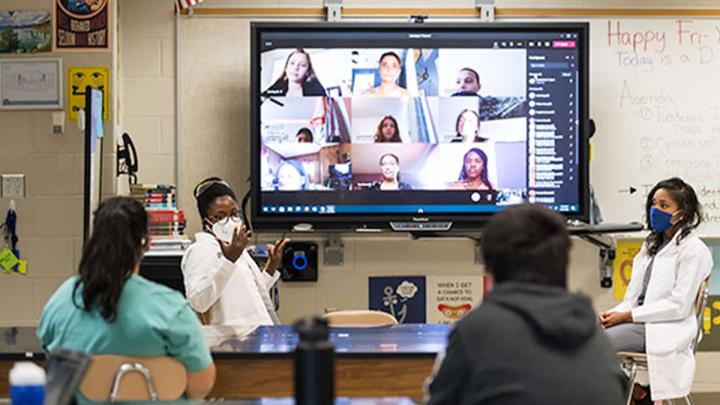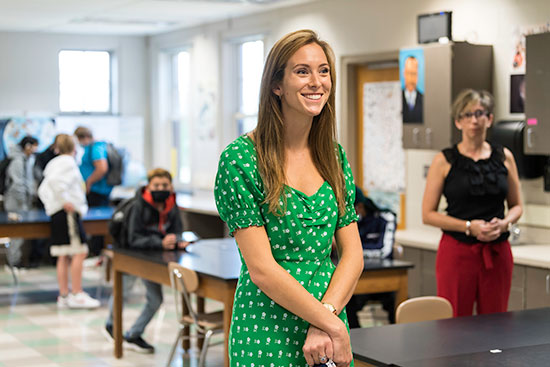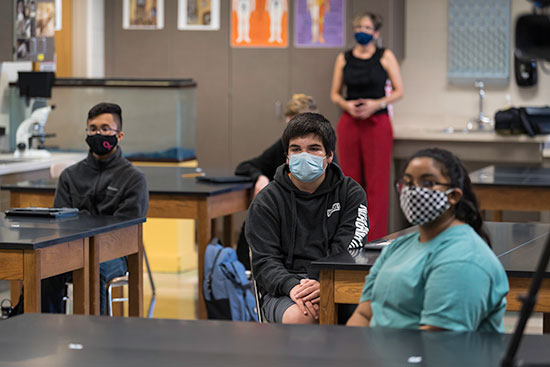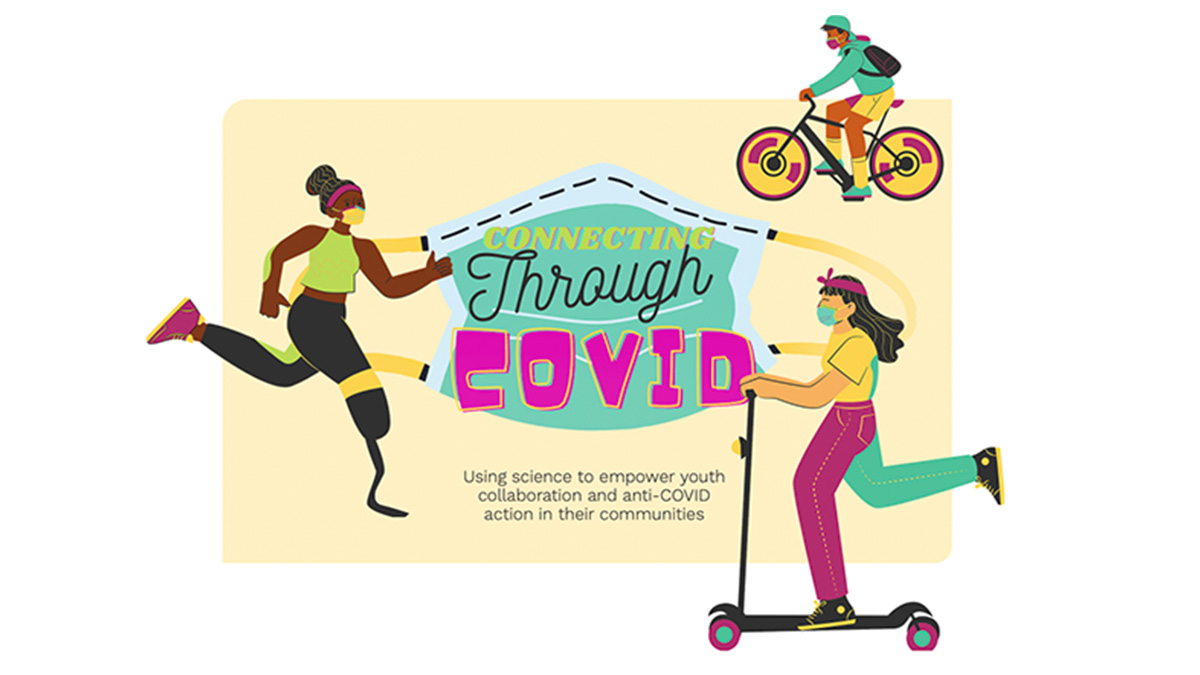
New unit developed by Rochester educators, doctors aims to help students understand the science and activism around the pandemic.
As teachers, students and their families continue to settle into a new school year, one thing is certain: safety is top of mind. And as schools and communities continue to face the uncertainty of a global pandemic, University of Rochester faculty and physicians have joined forces with grade 7-12 teachers to give local students the opportunity to learn about and cope with the virus in real time as part of their in-class and remote science instruction this fall.
A new partnership between the University’s Warner School of Education and School of Medicine & Dentistry and a diverse network of secondary science teachers and their schools will help Rochester-area youth amplify their voices in explaining why and how COVID-19 is impacting their communities and what they, together with their community, can do about it.
“We want to empower youth to act as science advocates and influencers in their circles and communities, so that they can do their part in keeping the Greater Rochester community healthy and safe,” says April Luehmann, PhD, associate professor and director of the science education program at the Warner School. She is leading the project, titled “COVID Connects Us: Using Science to Empower Youth Collaboration and Anti-COVID Action in Their Communities,” together with Paul Levy, MD, Charles Ayrault Dewey Professor of Medicine and chair of the Department of Medicine at the School of Medicine and Dentistry. “Connecting teens with medical mentors to support their understandings of the science of COVID helps them identify misinformation and nurtures an appreciation for the critical role science plays in our lives.”
 This summer, the local team, which also includes nine teachers and three University doctoral students, created a COVID-19 unit that will teach science concepts, aligned to the Next Generation Science Standards (NGSS), to build students’ understanding of the science around COVID-19. The culture-setting unit will position youth as informed science advocates in their circles and their community, including but not limited to churches, extended families, neighborhoods, and peer groups, to help slow or stop the spread of the pandemic. This approach comes with the push to prepare students to become informed citizens, critical thinkers, and communicators in solving complex ideas and relevant problems impacting their communities.
This summer, the local team, which also includes nine teachers and three University doctoral students, created a COVID-19 unit that will teach science concepts, aligned to the Next Generation Science Standards (NGSS), to build students’ understanding of the science around COVID-19. The culture-setting unit will position youth as informed science advocates in their circles and their community, including but not limited to churches, extended families, neighborhoods, and peer groups, to help slow or stop the spread of the pandemic. This approach comes with the push to prepare students to become informed citizens, critical thinkers, and communicators in solving complex ideas and relevant problems impacting their communities.
Embedded in the middle school science curricula this fall at four different school districts—Rochester, East Irondequoit, Brighton, and Naples — the COVID-19 unit will be implemented by 14 teachers who will be working collaboratively with 25 doctors, acting as medical mentors to more than 750 students and their teachers. In addition, the unit will be implemented by University master’s students in their teacher education program through Science STARS, an out-of-school time program for the Rochester City School District’s World of Inquiry School No. 58.
The cohesive unit, which began on the first day of school, consists of eight consecutive lessons that are each tied to an issue at hand, allowing students to explore preventive practices around COVID-19 and to formulate supporting scientific arguments. The lessons in the unit will support students in using the eight science practices from NGSS to develop a better understanding of the virus and its impact on humans, how it spreads and why some preventive measures are more effective than others, and how it is transmitted, while also deepening their scientific literacy practices of critiquing scientific claims, explaining the tentative nature of science, and constructing scientific arguments. The unit will also have an anti-racist component that interrogates the systemic injustices that leave people of color more vulnerable and thus disproportionately affected by the pandemic and supports youth in working to right some of those wrongs through, for example, direct access to health professionals.
 The students will design and conduct scientific investigations, engage in debates, and develop scientific models around effective social distancing, mask-wearing, handwashing, contact tracing, vaccines, and more. Following the completion of the eight lessons, youth will be able to assume the role of “teacher” in their circles, allowing them to contribute to the health literacy of their community with respect to COVID-19 and increase access to, and trust in, doctors and science.
The students will design and conduct scientific investigations, engage in debates, and develop scientific models around effective social distancing, mask-wearing, handwashing, contact tracing, vaccines, and more. Following the completion of the eight lessons, youth will be able to assume the role of “teacher” in their circles, allowing them to contribute to the health literacy of their community with respect to COVID-19 and increase access to, and trust in, doctors and science.
According to Levy, the COVID-19 pandemic has created a critical need for broad educational efforts across the community and society in general.
“I am very proud of the URMC faculty and residents who volunteered to help with this project and be paired up with Dr. Luehmann’s dedicated team of science teachers,” says Levy. “These teacher-physician teams will provide a unique linkage between our community’s educational programs and the medical center. My hope is this effort results in COVID-smart students who will also be COVID-safe students.”
During the sixth of eight lessons, medical experts, including Levy, will be interviewed by participating youth through Zoom as part of the “breaking news” themed lesson on developing critical scientific and health literacy and using what you learn to inform others. These student-led interviews, along with video-taped debates between pulmonary and critical care experts on COVID spread prevention, will be shared on Instagram with students and teachers using the hashtag #COVIDXUS.
 To conclude the COVID-19 unit, the students will present their scientific models and findings to the public at a showcase (dates and times will vary by school district). The Rochester area team of teachers, university faculty, medical professionals, and students created and will continue to update a new project website that includes the eight lessons, resources for youth and teachers, models and findings, and more. Learn more about the “COVID Connects Us” project and follow the students’ progress this fall: https://getrealscience.wixsite.com/covidxus.
To conclude the COVID-19 unit, the students will present their scientific models and findings to the public at a showcase (dates and times will vary by school district). The Rochester area team of teachers, university faculty, medical professionals, and students created and will continue to update a new project website that includes the eight lessons, resources for youth and teachers, models and findings, and more. Learn more about the “COVID Connects Us” project and follow the students’ progress this fall: https://getrealscience.wixsite.com/covidxus.
All nine of the Rochester area teachers who collaboratively created the COVID-19 unit are graduates of the Warner School’s Get Real Science! program, a 15-month science teacher preparation program grounded in authentic experiences that include an annual Get Real! Science Camp, the Science STARS afterschool program, and more. The Science STARS program will also implement the COVID-19 unit later this fall at Rochester’s World of Inquiry School. Learn more about the Warner School’s programs preparing science teachers.
(Photographs by University of Rochester photographer J. Adam Fenster.)